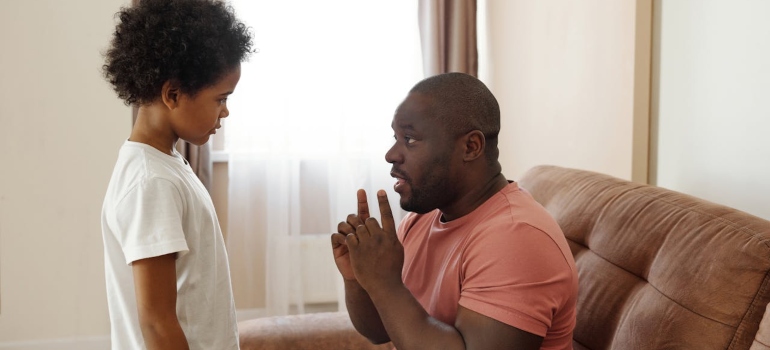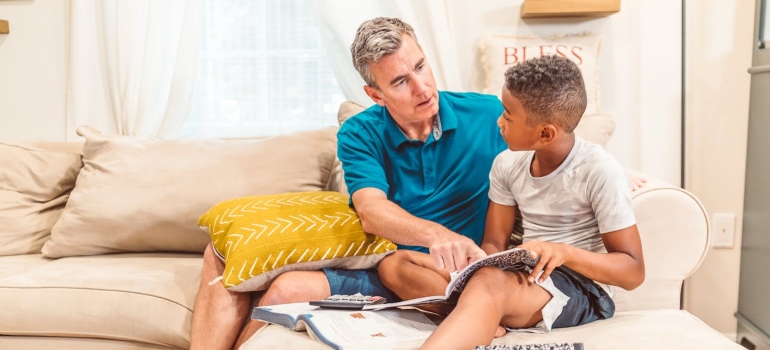Discussing drugs with your child can be challenging, but it’s crucial to start early. Proactive communication reduces stigma and empowers children. When you openly discuss the topic, it builds trust and offers them guidance. They will better understand the dangers of drug misuse and feel more comfortable sharing their concerns. This conversation helps them differentiate facts from myths and make safer choices. Talking to your child about drugs is one way to ensure they have the knowledge to navigate social situations. By encouraging these discussions, you provide them with the right tools. When equipped with facts, kids can confidently manage peer pressure and misinformation. This empowers them to make informed decisions. The conversation will help them stay clear-headed and develop critical thinking skills. With support, they can recognize the risks and avoid falling into dangerous patterns. It’s a valuable step for their future well-being.
Importance of Initiating the Conversation
Starting a conversation about drugs is vital. It’s not just about warning your child; it’s about arming them with knowledge. When children understand the risks and realities of drug use early, they are more equipped to resist peer pressure and make intelligent decisions. Proactive talks demonstrate that you, as a parent, are a trustworthy source of advice and information. Opening this dialogue also helps your child feel comfortable coming to you with questions or concerns. They won’t feel the need to rely solely on friends or online sources, which may provide inaccurate information. Instead, they know they can turn to you, creating a stronger bond of trust.

Addressing the topic early sets a foundation for open communication. This can lead to more detailed discussions as your child grows older. Each conversation can be tailored to their age and understanding, evolving as they do. By consistently revisiting the topic, you remind your child that they can always approach you, regardless of the situation.
Furthermore, discussing the dangers of drug use and the existence of support systems, like rehabs in WV, reinforces that help is available. It shows them that recovery is possible and that no situation is too dire for support. This can instill a sense of hope and practicality in facing life’s challenges.
Lastly, initiating this crucial conversation fosters resilience in your child. They learn to handle difficult topics with maturity and confidence. Knowing they have your support allows them to navigate the pressures of growing up with more ease and awareness. It’s not just a single talk—it’s an ongoing process that strengthens your relationship and prepares them for the future.
Age Appropriate Approach
A child’s understanding of drugs will vary greatly based on age and maturity level. Adapting your conversation is important to ensure they grasp the information. For young children, it’s best to use simple terms when discussing substances. You might explain that medicines should only be taken when a doctor or trusted adult provides them.
Older children, who are exposed to more information at school or online, need more comprehensive discussions. They often hear about various substances through friends or media. Highlight the potential effects and dangers of drugs while emphasizing the importance of making safe choices.
Teenagers, on the other hand, are likely to understand the risks but could minimize the consequences due to peer influence. It’s vital to explain the long-term effects of substance use, including how it can impact their goals and relationships. Ensure they understand that addiction is a real risk and that help is available.
When discussing drug rehab for young adults, emphasize that recovery resources exist and are effective. This will foster a supportive environment for open communication. Let your teen know that you’re there to help them if they ever face challenges with substance use.
Ultimately, you must tailor each conversation to your child’s comprehension level. Your approach should evolve as your child matures, keeping the dialogue relevant to their world. By doing so, you build a consistent message of safety and trust that prepares them for various situations.

Providing Accurate Information
Accurate information is essential when talking to your child about drugs. Kids are often exposed to myths and exaggerated stories, so providing truthful, unbiased facts helps dispel these misconceptions. This empowers children to make decisions rooted in knowledge. Explain the different types of drugs they may encounter, like alcohol, tobacco, and prescription pills. Highlight that each drug can harm physical and mental well-being. Be transparent about addiction, explaining how it can take hold and why it’s dangerous. Stress that addiction can affect anyone, regardless of their intentions or background. This understanding can help them recognize the potential danger early.
Include information about treatment options and support networks available for recovery. Mention holistic therapy for addiction, which treats the whole person, not just the symptoms. This shows them that recovery is possible and that help is available.
When providing this information, speak in a straightforward and age-appropriate manner. Your child should clearly understand the message without feeling overwhelmed. Providing factual details will give them confidence in your guidance and encourage them to seek your help with any concerns.
Create a Safe and Supportive Environment
Creating a safe and supportive environment is essential when talking to your child about drugs. Children need to feel that they can approach you without fear of judgment or punishment. This encourages open and honest communication about their concerns and questions. Establish a non-judgmental atmosphere by listening to your child’s worries attentively. Avoid interrupting, and don’t immediately jump to conclusions. Instead, ask open-ended questions to understand their perspective. By doing this, you can gain valuable insight into their thoughts and worries.
After listening, acknowledge their concerns with empathy and provide answers in a calm tone. Your child should feel understood and reassured that their feelings are valid. When discussing drugs, use clear language and avoid harsh criticism. Even if your child confesses experimenting, approach the situation thoughtfully and without anger. Offer support and mention available resources, like family therapy for addiction. This shows that recovery can involve collective healing and strengthens trust.
A safe environment also means establishing ground rules together. These expectations should clearly define behavior boundaries and consequences. However, they should also encourage questions, learning, and personal growth. Talking to your child about drugs requires patience, understanding, and an environment where they feel secure. Moreover, fostering this environment strengthens your bond and ensures that your child is more likely to come to you with future concerns. They will trust you more as they recognize your unwavering support.

Discussing Peer Pressure
Peer pressure is a significant factor in a child’s decision-making. Children often face immense pressure to fit in. Understanding this pressure is key to helping them resist it. Start by acknowledging that it’s normal to want to belong. However, it’s also important to recognize negative influences. Let your child know they have the right to say “no” to something they aren’t comfortable with.
Discuss specific situations your child might encounter like being offered cigarettes or alcohol. Provide practical refusal strategies they can use confidently. For instance, they could suggest a different activity or firmly state their personal choice. Let them know that true friends respect their decisions. If they feel uncomfortable or unsafe, it’s okay to walk away. Encourage them to reach out to trusted friends and family for support.
Also, you can discuss how peer support in recovery can be a positive influence, promoting healthy and responsible behavior. This type of peer support emphasizes that not everyone will pressure them into risky actions.
Sharing Personal Experiences
Sharing personal experiences can help your child understand the reality of drug misuse. Real-life stories create a deeper impact than abstract warnings. If you’ve personally seen the effects of addiction, consider sharing those experiences thoughtfully. Avoid being overly dramatic or frightening, instead convey the facts. Describe how drugs affected relationships, health, or education and highlight the importance of avoiding experimentation to prevent serious consequences.
When sharing stories, emphasize the power of making positive choices. Explain how the people you know who avoided drugs found healthier ways to cope. Discuss how those who struggled eventually sought help and turned their lives around. Mention that individual therapy for addiction helped many people achieve recovery.
Your child should understand that the consequences of drug use are real, but that recovery is possible. Personal experiences can illustrate this truth clearly. By seeing these scenarios, your child will have a better perspective on drugs and their effects. Personal stories can be emotional, so offer your child a chance to ask questions or share their thoughts.

Setting Clear Expectations and Boundaries
It’s crucial to set clear expectations and boundaries when talking to your child about drugs. Children thrive on knowing where the lines are drawn. Establishing these rules early on will guide their behavior. Begin by explaining your family’s values regarding drug use and be clear about the behavior you expect from them. For instance, tell them explicitly that you don’t favor drug use, whether it’s cigarettes, alcohol, or other substances.
Explain the consequences of violating these boundaries. These consequences should be reasonable and consistently enforced, so your child understands their importance. Reinforce that rules aren’t there to punish but to protect them. Help your child see that avoiding drugs isn’t just about obeying rules but is also for their well-being.
However, don’t just impose rules, but involve your child in setting expectations and boundaries. This can help them feel responsible and invested in maintaining a drug-free lifestyle. Overall, ensure these guidelines are not only clear but also practical. Boundaries should empower your child to make safe choices confidently. They need to feel secure and understand you’re their ally in making healthy decisions.
Encouraging Questions and Dialogue
Encouraging questions and dialogue helps build a stronger relationship when talking to your child about drugs. Children often struggle with their worries and need reassurance, so invite them to share any concerns or misunderstandings they have about drugs. Create a supportive atmosphere where they feel safe asking questions, no matter how small.
Listen carefully and respond with honest, age-appropriate answers. If you don’t know something, find the answer together. This collaborative approach can build trust. Help them understand the stages of addiction so they can recognize and avoid risky behavior. Let them know that they can always talk to you if they need advice or feel pressured. Fostering an open dialogue helps your child feel heard and supported. They will be more willing to ask for guidance if they’re unsure about anything related to drug use. A strong, two-way conversation is a powerful tool in prevention.
Identifying Warning Signs
It’s vital to identify warning signs that may indicate experimentation or substance abuse. Sudden behavioral changes are often the first clue. Look out for shifts in mood, a decline in school performance, or unexplained hostility. Physical symptoms can also be revealed. Red eyes, unusual drowsiness, or frequent nosebleeds can be early indicators. Changes in appetite or sleep patterns shouldn’t be overlooked.
Pay attention to social changes as well. If your child is suddenly withdrawing from family activities or spending time with a new group of friends, it could be a red flag. Trust your instincts if something seems off. Directly approach your child with your concerns while maintaining a supportive tone. Keep the conversation open and listen carefully to what they share. Early identification and intervention can prevent occasional experimentation from escalating into serious substance abuse.

Seeking Professional Help
Sometimes, the warning signs require more than just a conversation. If your child’s behavior suggests deeper issues, it’s essential to seek professional help. Start by reaching out to your child’s pediatrician, school counselor, or mental health professional. Talking to your child about drugs can be challenging, and a professional can guide both of you through the process. They can offer unbiased advice, identify underlying problems, and suggest effective strategies for moving forward. Don’t hesitate to explore specialized treatment options, like individual or family therapy. Many organizations offer comprehensive programs tailored to adolescents, providing support and education. Community support groups are also valuable resources. Seeking help isn’t a sign of weakness; it’s a proactive step toward protecting your child’s well-being. By connecting with the right professionals, you can get the support needed to address the situation with understanding, empathy, and effective action.



